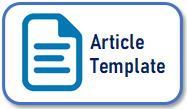The Rational Behavior Concept in Islam and Policy Framework Perspectives
DOI:
https://doi.org/10.14421/grieb.2013.012-02Keywords:
Maslahah, Islamic Banking, Indonesia, MalaysiaAbstract
The primary notion of preference and utility under Islamic perspective is to restore the consumer behavior in accordance with the concept of maslahah. The paper basically tries to apply the concept of maslahah by specifically defining it into Good Deeds (G) and Bad Deeds (B) concepts subject to a certain limit of Ability (A). Hicksian and Marshallian demand functions are used to model maslahah under Islamic banking practices in Indonesia and Malaysia. The paper employs several variables to gauge the Maslahah (M) as well as Ability (A) function. Empirically, the variables used to measure Maslahah function are deposit, financing, and rate of return variables. In addition, Cobb-Douglas (CD) utility function is utilized to model the maslahah. Indonesia seems to have bigger maslahah compared with Malaysia according to Islamic Banking practices, but more effort should be persistently undertaken by Indonesian Islamic Banks to retain a certain level of maslahah instead of Malaysia. Since maslahah is seen as the manifestation of Good Effort (Eg), some policies frameworks could be suggested, namely regarding shariah framework, tax regime, and someoutstanding issues and challenges for Islamic banking development.References
Abduh, M., Omar,M.A., and Duasa,J., 2011. The Impact of crisis and macroeconomic variables towards Islamic banking deposits. American Journal of Applied Sciences, Vol.8 No.12, 1413-1418.
Agil, Syed Imar Syed, 1989. Rationality in Economic Theory : A Critical Appraisal. Journal of Islamic Economics Vol 2, No. 2,79-94.
Bacha, O.L., 2004. Dual banking system and interest rate risk for Islamic banks. MPRA No. 12763.
Boyd, J.H., Levine, R. and Smith, B.D., 2001. The impact of inflation on financial sector performance, Journal of Monetary Economics, Vol. 47, 221-248.
Chong, B. S. and Liu, M.H., 2008. Islamic banking: Interest-free or interest-based?, PacificBasin Finance Journal, Vol. 17 No. 1, 125-144.
Choudhury, Masudul A., 1991. Social Choice in an Islamic Economic Framework. The American Journal of Islamic Social Sciences, Vol 8, No. 2.
Haneef, Mohamed Aslam, and Hafas Furqani, 2009. Developing the Ethical Foundation of Islamic Economics : Benefiting from Toshihiko Izutsu. Intelectual Discourse, Vol 17, No.2, 173-199.
Haron, S. and Ahmad, N., 2000. The effects of conventional interest rates and rate of profits on funds deposited with Islamic banking system in Malaysia, International Journal of Islamic Financial Services, Vol. 1 No. 4, 1-7.
Haron, S. and Wan Azmi, W.S., 2008. Determinants of Islamic and conventional deposits in the Malaysian banking system, Managerial Finance, Vol. 34 No. 9, 618-643.
Hasan, M. and Dridi, J., 2010. The effects of the global crisis on Islamic and conventional banks: A comparative study. IMF Working Paper, WP/10/201.
Heffetz, Ori, 2007. Cobb-Douglas Utility with Nonlinear Engel Curves in a Conspicuous Consumption model.
Huybens, E. and Smith, B.D., 1999. Inflation, financial markets and long run real activity, Journal of Monetary Economics, Vol. 43, 283-315.
Ismal, Rifki, 2010. Depositors? withdrawal behavior in Islamic banking: case of Indonesia, Humanomics, Vol. 27 No. 1, 61-76.
Juster, F.T. and Wachtel, P., 1972. Inflation and the consumer, Brookings Papers on Economic Activity, Vol. 1, 71-121.
Menestrel, Marc Le., 2001. Economic Rationality and Ethical Behavior: Ethical Business between Venality and Sacrifice. An European Review.
Misanam, et al., 2009. Ekonomi Islam. Pusat pengkajian Pengembangan Ekonomi Islam, University Islam Indonesia : Yogyakarta.
Mittermaier, Ferdinand. Nice to know about CES Functions (Preliminary).
Kaleem, A., 2000. Modelling monetary stability under dual banking system: the case of Malaysia, International Journal of Islamic Financial Services, Vol. 2 No. 1, 21-42.
Kaplan, Jonathan, 2008. Economic Rationality and Explaining Human Behavior : An Adaptationist Program. The International Journal of Interdiciplinary Social Sciences Vol 3, No 7.
Kasim, S. et al., 2009. Impact of monetary policy shocks on the conventional and Islamic banks in a dual banking system: evidence from Malaysia, Journal of Economic Cooperation and Development, Vol. 30 No. 1, 41-58.
Kasri, R.A. and Kasim, S., 2009. Empirical determinants of saving in the Islamic banks: Evidence from Indonesia, JKAU: Islamic Econ. Vol. 22 No. 2, 181- 201.
Oppenheimer, Joe A., 2008. Rational Choice Theory.
Rajab, Khairunnas, and Efrinaldi, 2009. Rekontruksi Teory Maslahah dalam Kajian Pembaharuan Perundangan Islam : Analisis terhadap Pemikiran Najm Al Din Al Tufi. Shariah Journal Vol 17, No. 3, 593-606.
Ramli, Asharaf Mohd, et al., 2007. The Theory of Consumer Bahavior : Conventional vs Islamic. Proceedings of the 2nd Islamic Conference (iECONS2007) organized by Faculty of Economics and Muamalat, Islamic Science University of Malaysia.
Rohmah, Nyimas, 2006. Deposits determinants of Islamic bank in Indonesia: An ARDL modeling approach, Unpublished Master Thesis, Kulliyah of Economics and Management Sciences of IIUM.
Rutherford, Thomas F., 2008. Calibrated CES Utility Function : a Worked Example.
Shaharuddin, Amir , 2010. Maslahah-Mafsadah approach in Assessing the Shariah Compliance of Islamic Banking Products. International Journal of Business and Social Sciences. Vo 1, No.1
Yudistira, D., 2004. Efficiency in Islamic banking: an empirical analysis of eighteen banks, Islamic Economic Studies, Vol. 12 No. 1, 1-19.
Zainol, Zairy and Kasim, Salina, 2010. An analysis of Islamic banks? exposure to rate of return risk, Journal of Economic Cooperation and Development, Vol. 31 No. 1, 59-84.
Downloads
Published
Issue
Section
License
Global Review of Islamic Economics and Business is licensed under a
Creative Commons Attribution-ShareAlike 4.0 International License



















